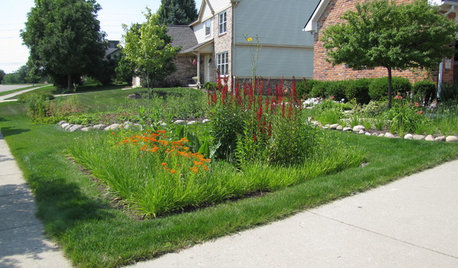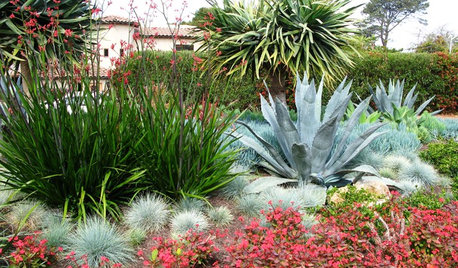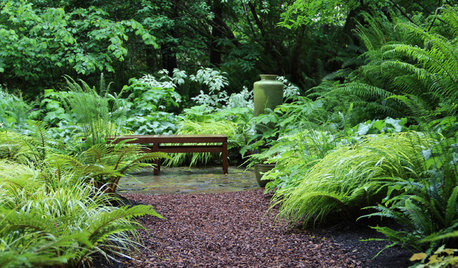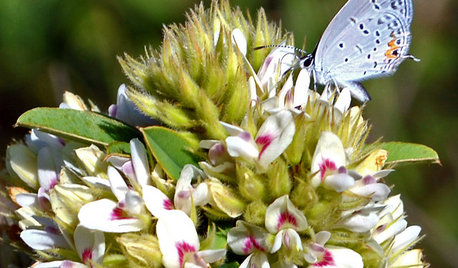I suck at composting and I need to amend my soil
trpnbils
9 years ago
Related Stories

GARDENING GUIDESHouzz TV: Make a Worm Bin for Rich Soil and Happy Plants
A worm-powered compost bin that can fit under a sink turns food scraps into a powerful amendment for your garden. Here’s how to make one
Full Story
GARDENING GUIDESGet on a Composting Kick (Hello, Free Fertilizer!)
Quit shelling out for pricey substitutes that aren’t even as good. Here’s how to give your soil the best while lightening your trash load
Full Story
LANDSCAPE DESIGNHow to Shape a Rain Garden and Create the Right Soil for It
Learn how to grade, lay out and amend the soil in your rain garden to support your plants
Full Story
GARDENING GUIDESHow to Stop Worrying and Start Loving Clay Soil
Clay has many more benefits than you might imagine
Full Story
GARDENING GUIDESGardening Solutions for Heavy Clay Soils
What’s a gardener to do with soil that’s easily compacted and has poor drainage? Find out here
Full Story
GARDENING GUIDESGrow a Beautiful Garden in Alkaline Soil
Got alkaline soil? Learn how to manage it and the many beautiful plants that will thrive in this ‘sweet’ soil
Full Story
GARDENING GUIDESGardening Solutions for Dry, Sandy Soils
Has your desert or beachy site withered your gardening creativity? Try these ideas for a beautiful, easy-care landscape
Full Story
GARDENING GUIDESGet the Dirt on Your Garden’s Soil
Understand how your soil supports your plants so you can ensure your garden’s success
Full Story
GARDENING GUIDES10 Solutions for Soggy Soil
If a too-wet garden is raining on your parade, try these water-loving plants and other ideas for handling all of that H2O
Full Story
GARDENING GUIDES5 Prairie Wildflowers That Can Heal Your Soil
Get free, organic soil fertilizer with nitrogen-pumping plants that draw pollinators too
Full StorySponsored
Columbus Area's Luxury Design Build Firm | 17x Best of Houzz Winner!
More Discussions








KarenPA_6b
Kimmsr
Related Professionals
Maple Valley Landscape Architects & Landscape Designers · Fort Lee Landscape Architects & Landscape Designers · Aurora Landscape Contractors · Deerfield Beach Landscape Contractors · La Vista Landscape Contractors · Live Oak Landscape Contractors · Peachtree City Landscape Contractors · Pomona Landscape Contractors · Kyle Decks, Patios & Outdoor Enclosures · Lockport Decks, Patios & Outdoor Enclosures · Miami Decks, Patios & Outdoor Enclosures · Novi Decks, Patios & Outdoor Enclosures · Roseville Decks, Patios & Outdoor Enclosures · Tooele Decks, Patios & Outdoor Enclosures · Highland Decks, Patios & Outdoor EnclosuresMaryMcP Zone 8b - Phx AZ
MaryMcP Zone 8b - Phx AZ
bart_2010
NHBabs z4b-5a NH
trpnbilsOriginal Author
trpnbilsOriginal Author
calistoga_al ca 15 usda 9
kokopelli5a
lazy_gardens
trpnbilsOriginal Author
wayne_5 zone 6a Central Indiana
Laurel Zito
Kimmsr
Laurel Zito
toxcrusadr
Kimmsr
elisa_z5
Laurel Zito
KarenPA_6b
toxcrusadr
lisascenic Urban Gardener, Oakland CA
elisa_z5
Laurel Zito
trpnbilsOriginal Author
Kimmsr
elisa_z5
armoured
Kimmsr
armoured
ssmdgardener
luckygal
Kimmsr
Laurel Zito
armoured
Laurel Zito
Kimmsr
toxcrusadr